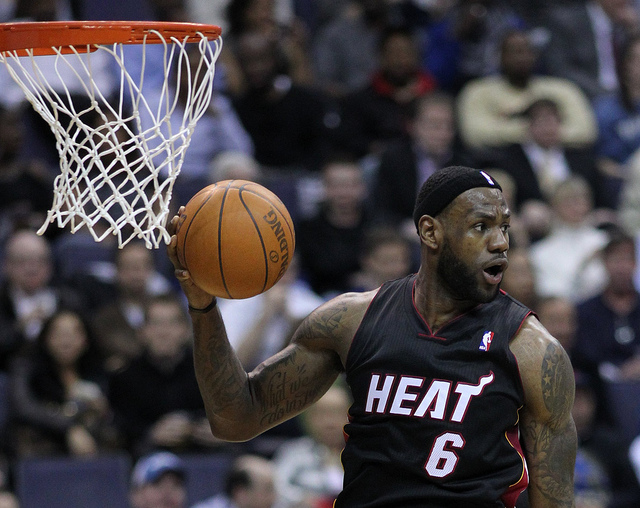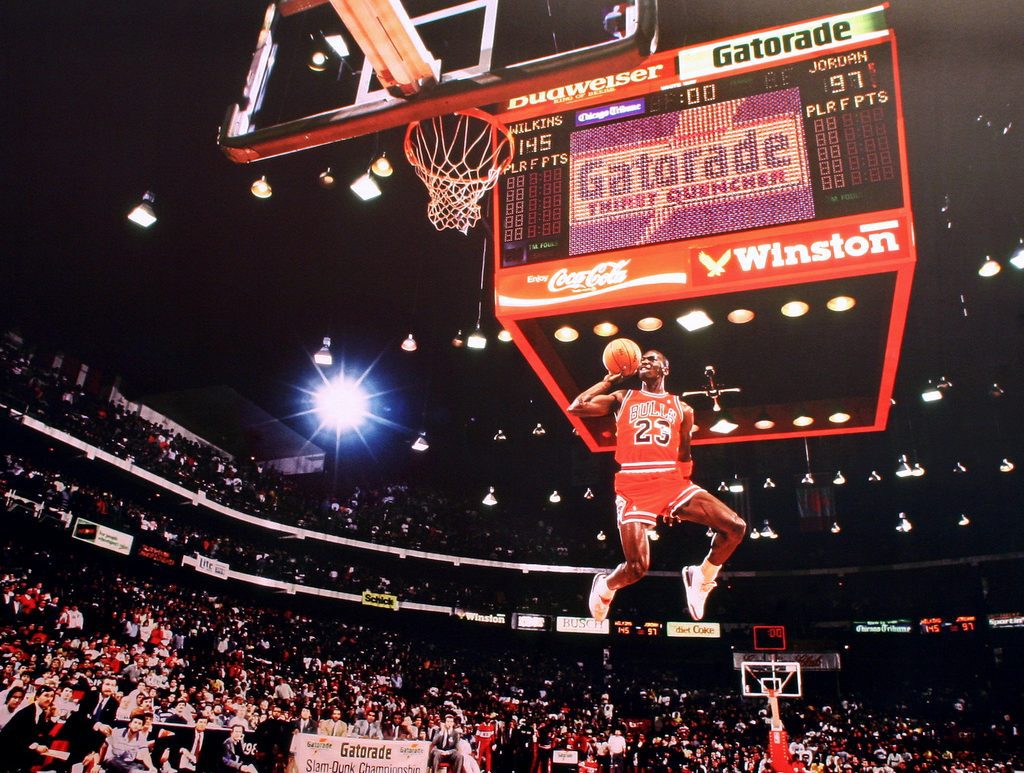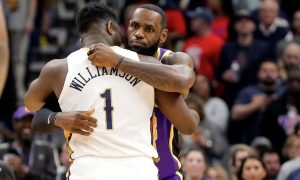
Image courtesy of Keith Allison/Flickr.
Brought to you by our friends at Fantasy Basketball Money Leagues.
During his first NBA Finals appearance in 2007, LeBron James and his Cleveland Cavaliers were “le-broomed” by the San Antonio Spurs, 4-0. According to Bloomberg.com on June 21, 2013, Tim Duncan whispered something to LeBron James after that series:
“Duncan, whose Spurs in 2007 swept the Cavaliers, told a then 22-year-old James that ‘the league is going to be yours soon.’”
Duncan was prophetic. James moved to Miami in 2010 and immediately owned the league. After losing to the Dallas Mavericks in the 2011 NBA Finals, the Miami Heat won back-to-back titles, and are currently battling Duncan’s Spurs in the 2014 NBA Finals.
The Heat became the third franchise in NBA history to make four consecutive NBA Finals appearances. James and the Heat also have the opportunity to be the sixth team in the NBA’s 67-year history to win a three-peat. The last teams to do that were Michael Jordan’s Chicago Bulls from 1996-98 and Shaquille O’Neal’s Los Angeles Lakers from 2000-02.
A three-peat would also bring James’ 2010 promise of “not one, not two, not three”a little bit closer to reality, but will that promise be really fulfilled?
Let’s try to find out.
Where Does LeBron Rank?
Let us compare LeBron James to the other greatest players during their prime. By “prime” here, let us consider that the player has achieved the summit of individual and team success. In the NBA, it’s winning both the NBA MVP and the NBA championship.
Since LeBron is the topic of our discussion, let us set the comparison to his age. Since this season is not yet over, let’s make last season the cut-off. For the purposes of discussion, let us also use basketball age instead of biological age, since this is being used by statisticians.
Below is a list of 13 NBA players, who at age 28, won the MVP and NBA title:
| Age 28 Season | NBA Titles By Age 28 | NBA TitlesAfter Age 28 Season | |
| Bob Cousy | 1956-57 | 1 | 5 |
| Bob Pettit | 1960-61 | 1 | 0 |
| Bill Russell | 1962-63 | 6 | 5 |
| Willis Reed | 1970-71 | 1 | 1 |
| Kareem Abdul-Jabbar | 1975-76 | 1 | 5 |
| Dave Cowens | 1976-77 | 2 | 0 |
| Bill Walton | 1980-81 | 1 | 1 |
| Moses Malone | 1983-84 | 1 | 0 |
| Larry Bird | 1984-85 | 2 | 1 |
| Magic Johnson | 1987-88 | 5 | 0 |
| Michael Jordan | 1991-92 | 2 | 4 |
| Shaquille O’Neal | 2000-01 | 2 | 2 |
| Tim Duncan | 2004-05 | 3 | 1 |
*stats from basketball-reference.com
LeBron James won his second NBA title at age 28 and first MVP much earlier in 2009-10. If we look at the list, the 13 players won a total of 25 NBA titles after age 28, or an average of 1.92 titles. On the conservative argument, that would mean two more NBA titles for James before his career is over.
King James needs four more NBA titles to match MJ, so if we base it from our assumptions, he would have a 30.7 percent chance of doing that. This is because from the 13 players on the list, only four players, namely Russell, Cousy, Abdul-Jabbar, and Jordan, were able to win at least four more championships after age 28.
He also has a 23 percent, chance of winning seven titles.
That being said, the odds are stacked against him for two reasons. One is his physical health and the other is salary cap.
James has been an iron man in his career and has not suffered a major injury thus far, but he’s been playing in the NBA since he was 18. At age 29, this is his 11th season in the league. Also, athletes typically peak in their mid-20s to their early 30s. So James may be already there and could be in a “natural physical decline” for the next couple of years due to the wear and tear of a long and hard basketball career.
Second is the NBA salary cap. Russell, Cousy, and Abdul-Jabbar played in the pre-salary cap era, which started in 1984-85. Only Michael Jordan (4) and Shaquille O’Neal (2) won more than one title during the salary cap era after the age of 28.
Salary Cap Era
The salary cap was established to control costs and to promote parity between professional teams. Although it has exceptions and complex rules, it was created to maintain balance in the NBA. However, over the years teams have worked around this rule to get better. Such was the story of the Heat.
In 2010, LeBron James, Dwyane Wade, and Chris Bosh took in less than the maximum salary to join forces in Miami. Their goal was to win multiple NBA titles. They have won twice after losing in their maiden campaign. They are currently playing the Spurs in their fourth consecutive NBA Finals appearance, and things are looking good.
In February 2013, LeBron James told ESPN.com:
“I have not had a full max deal yet in my career — that’s a story untold. I don’t get (the credit) for it. That doesn’t matter to me; playing the game is what matters to me. Financially, I’ll sacrifice for the team. It shows for some of the top guys, it isn’t all about money. That’s the genuine side of this, it’s about winning. I understand that.”
James could’ve taken much more money in Cleveland, but he left his hometown for the opportunity to win an NBA championship.
That being said, each of the Big 3 will be eligible for free agency this summer, and the salary cap, which helped put them together, could also be the one that will tear them apart. Given their advancing age and the fact that they have already won a couple of rings (maybe three), there is a chance that one or all of them will cash-in on what appears to be their last chance at getting a maximum salary.
The outcome of the 2014 NBA Finals could be the deciding factor. If they win, they will have a shot at the greatness of winning four straight titles next season.
The Fear of Failure
It’s always unfair to compare LeBron James to the greatest, but then again he was the one who said he wanted to retire as the greatest of all time.
James told ESPN.com in 2013 via CBSSports.com:
“You’re in a different era today. With social media and 24-hour sports-talk radio, every single game, even quarter, of yours is critiqued. That wasn’t the case back in the day when MJ played.”
After the Heat lost Game 1 of the 2014 NBA Finals, which James could not finish due to cramps, he took a lot of heat from his critics once again. James told Michael Wilbon of ESPN.com:
“I know I’m the easiest target that we have in sports, I’m aware of it. I really am. I believe it.”
He is the easiest target in sports because he is the best out there today. LeBron James is the most gifted basketball player this world has ever seen. It’s not Michael Jordan, not Kobe Bryant, nor Bill Russell. James’ unique ability to do virtually everything on the court is otherworldly, and anything less than a title would be a failure.
In the same 2013 interview with ESPN.com, James said this about failure:
“That’s one of my biggest obstacles. I’m afraid of failure. I want to succeed so bad that I become afraid of failing.”
That fear of failure is proof that the king of basketball is as human as all of us, but James has always immediately bounced back from sub-par performances. That’s a testament to his maturity, greatness, and mental approach towards failure. Back to the 2013 ESPN.com interview, he was asked about how he deals with failure. James replied:
“Keep winning and I don’t have to worry about it. Keep winning.”
It’s a very scary answer. It’s scary to his opponents. It’s scary to the record books and all-time record leaders. LeBron James is just 29 years old. Right now, he’s got the whole basketball world in the palm of his hands. He will never silence his critics, but he will keep on winning to prove them wrong.
As for NBA titles, eight would be great, but this is a different era; a more competitive and complex one.
Dwyane Wade said after the Heat won the title in 2013, via Bloomberg.com:
“The story is still yet to be seen what he’s going to end up with. He’s a special player. We enjoy having him here and what he brings every night is unbelievable.”
As for the rest of us, we’re all lucky to be witnesses to his greatness.
















